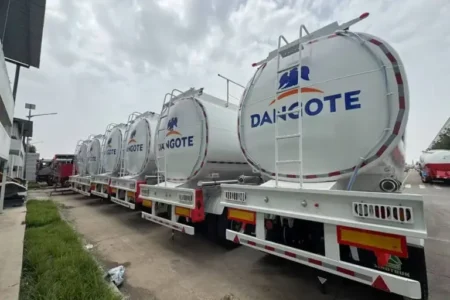Dangote Petroleum Refinery has said that its employees’ membership in trade unions is voluntary and not mandatory, in accordance with the Nigerian Constitution and International Labour Organisation standards.
The business announced this in a press release on Wednesday, in response to what it called “distortions of facts” by the Nigeria Union of Petroleum and Natural Gas Workers over its trade dealings with workers.
The refinery stated that it does not interfere with or limit employees’ ability to freely join legally recognized unions.
“It is therefore misplaced to attribute responsibility to Dangote Petroleum Refinery for the personal choices made by drivers regarding union affiliation,” the company stated.
Dangote disputed charges that it compelled drivers to sign contracts that prohibited union membership, calling the assertion absurd.
It encouraged NUPENG to prioritize resolving its internal disagreement with the Petrol Tanker Drivers unit before “embroiling the refinery in its conflicts.”
The corporation also stated that claims of union suppression were part of a larger strategy to undercut private sector success.
“Dangote Petroleum Refinery maintains a cordial and cooperative relationship with all recognized trade unions, including NUPENG. We have consistently supported their legitimate activities within our facility, including providing office space and enabling member engagement and dues collection without interference,” it stated.
The refinery also restated its support for the Ministry of Labour’s mediation efforts, urging NUPENG to respect the continuing dialogue process.
“We urge NUPENG to act in good faith, respect the ongoing dialogue process, and refrain from making statements that could undermine national economic recovery efforts led by His Excellency, President Bola Ahmed Tinubu GCFR,” the statement read.
Dangote Industries Limited, Nigeria’s largest private-sector employer, stated that it prioritizes employee welfare, safety, and career advancement. It revealed that drivers in its new Compressed Natural Gas vehicle scheme are paid three times more than the national minimum wage, in addition to group insurance, pensions, medical allowances, housing perks, and loan access.
The company stated that the introduction of 10,000 CNG-powered trucks would result in at least 60,000 direct jobs and several indirect opportunities.
It described the N720 billion expenditure as part of efforts to cut logistics costs, extend domestic refining benefits to remote areas, and assist the Federal Government’s energy transition strategy.
Dangote noted that since the refinery’s opening a year ago, Nigeria has transitioned from Africa’s largest importer of refined fuel to a net exporter, reaching markets in the United States. The company emphasized the production of byproducts such as polypropylene, base oils, and jet fuel, which it claims are fueling growth in plastics, aviation, lubricants, and agro-processing.
The corporation claims that its efforts have eliminated periodic fuel scarcity, stabilized prices, and delivered high-quality fuel despite obstacles from substandard product imports.
It further stated that over 570,000 jobs had been created in logistics, construction, and maintenance, with host communities benefiting from improved roads, power, and water supplies.
The company stated that it had become a hub for skills transfer, training thousands of Nigerian engineers and technicians in modern refining.
Speaking on concerns of monopoly, Dangote dismissed them as “recycled falsehoods.”
“As for claims of monopoly, we reject these as recycled falsehoods. The greater concern lies in the inaction of those with the means to invest in Nigeria, who instead choose to remain on the sidelines. At Dangote, we have chosen to invest boldly in Nigeria’s future, and we will continue to do so. It is time others follow suit,” the company said.











